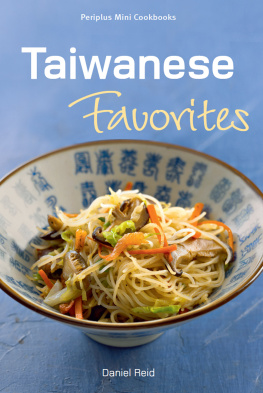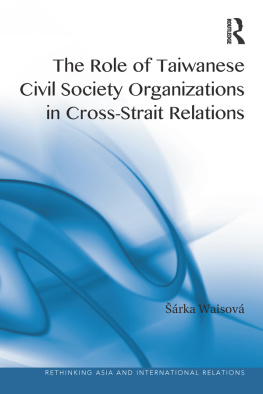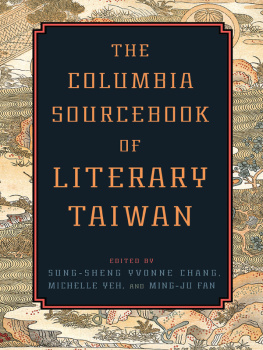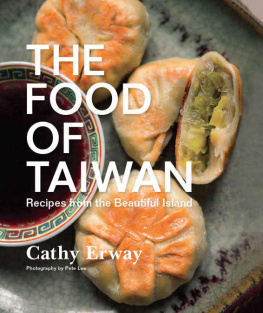Contents
Landmarks
Page List
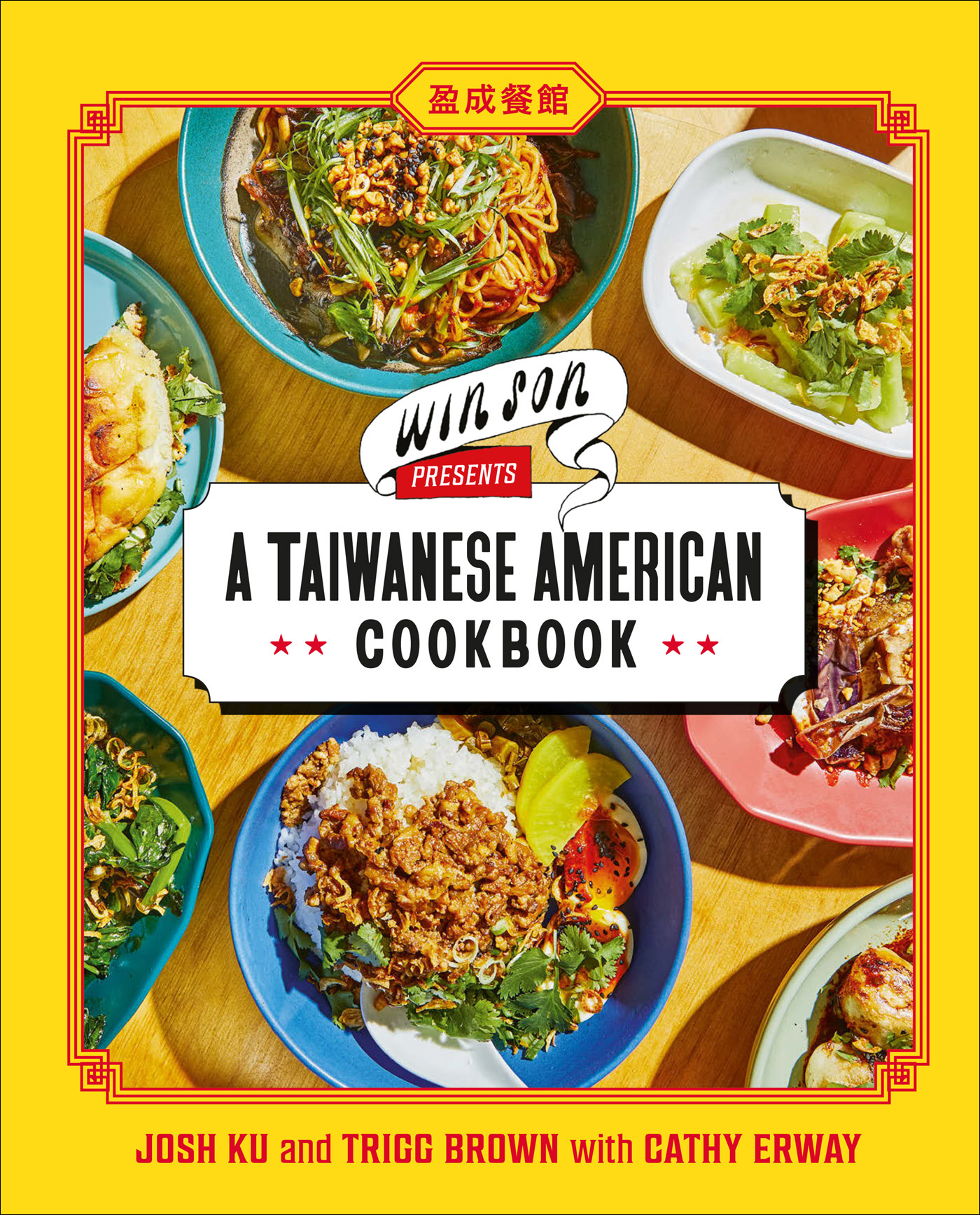





Kat Norton-Bliss, Stephanie Auquilla, Gabrielle Cambronero, Danielle Spencer, Josh Ku, Avery Gindraux, Chun-Yen Huang, Scott Conrad, David DeSimone, Denise Beauchamp, Flavio Guzman, Arion Pennington, Laura Carvajal, Trigg Brown, Isak Buan.
Prologue:
THE TAIWANESE AMERICAN DREAM
In August 2015, I received a bizarre email. It was from a producer at Heritage Radio Network, where I hosted a podcast, and the subject line was Taiwanese Food Connection!
The content was brief: Trigg, a friend of the network and former cook at Craft and current chef at Upland, is looking to possibly open a Taiwanese restaurant in Brooklyn. I wanted to introduce you two and maybe Trigg could pick your brain sometime! He read your book and loved it.
I couldnt believe what I was reading. I had just spent the last few months promoting the launch of my cookbook, The Food of Taiwan, which was one of the first US-published cookbooks to explore the island-nations cuisine. And I had spent the last several months before that searching for US-based Taiwanese chefs, experts, and other Taiwanese American community organizers who I could partner with on events for the cookbooks launch. I became friendly with a few Taiwanese American food professionals who participated in things like panel events with me, and I visited Taiwanese American organizations from city to city.
It was a lot of fun. When I first shopped that book proposal around, in 2010 and 2011, nobody wanted to touch it. I learned then that a lot of Americans had no idea what or where Taiwan was. Uncomfortable meetings with agents and editors ensued. Then, over the next few years, Taiwanese food and culture slowly became more recognizable in popular culture. This was thanks in no small part to Eddie Huang, whose hit restaurant Baohaus helped launch a multifaceted, and highly visible, film and television career. Other young Taiwanese American pop culture sensations, like basketball player Jeremy Lin and fashion designer Jason Wu, proudly branded themselves as Taiwanese American, too. This was all excitingand yes, I persevered and finally got that cookbook deal. But through all these discussions, meetings, and events that I had after its publication, I began to sense that there was something missing in the current landscape of Taiwanese food culture in the United States.
At this time, a lot of the Taiwanese restaurants I encountered in New York City and New Jersey, where I grew up, seemed intent on recreating some of the islands greatest street foods, for a mostly Taiwanese American audience. Many others were clandestinely Taiwanesebearing no trace of the word Taiwanese on their menus or in their nameslike A & J Bistro in East Hanover, New Jersey, where my mom and I would often go for Taiwanese beef noodle soup and fried pork chops over rice. There didnt seem to be too many restaurants at the time that fashioned themselves as being self-aware of both their Taiwanese and American identitiesthat is, restaurants that strove to really celebrate the changes to a cuisine that occur in a diaspora, rather than hide them. Those changes might be due to having a different set of accessible ingredients, different lifestyle or dining-out habits, or just different preferences; they might even incorporate ideas from elsewhere, based on the chefs unique lived experiences in America. In short, I was looking for food that was proudly Taiwanese American.
But what did looking to possibly open a Taiwanese restaurant in Brooklyn mean? Looking back at the email from my friend, what did this chef from Craft and Upland, two New American restaurants in New York City with a local-seasonal bent and European core, have to do with any of that? And what kind of a name was Trigg?

Trigg Brown was the full name. We exchanged a few emails that summer, before he headed off to Taiwan for a while. The next thing I knew, it was February 2016, and Trigg reached out to me to ask if I would like to collaborate on a soft-opening pop-up event at his soon-to-be restaurant. He saw that I had recently helped out with an event by Yumpling, a Taiwanese American pop-up (now a restaurant and food truck), and he invited them to participate as well. The restaurant wouldnt be opening until later that spring, but we could serve a collaborative menu for friends and family for a few nights, he suggested. It sounded fun. But one thing: What is your restaurant going to be called? I asked.
Trigg responded: The restaurant was Winsome, but some LA breakfast joint trademarked the name last year so were figuring out a new one. Sucks because it was Joshs grandfathers company, Winsome, that inspired our name, and weve been branding as Winsome for a while now.
Josh Ku was the restaurants cofounder. By that time I had gathered that he was the Taiwanese American of the two of them, whereas Trigg was a white guy. And they were best friends. I met them both in person shortly after, at their work-in-progress restaurant on a corner of East Williamsburg jammed with bodegas, honking traffic, and hipsters. There were no chic New American restaurants in earshot, and there werent any Asian restaurants either, besides Chinese takeout. Meeting the two friends in their space and talking over our pop-up plans, it was clear that these werent your average restaurant owners. For one, they were both in their mid-twenties and had never run a restaurant before.
Josh was slinky and tall as a beanstalkhe was probably the tallest East Asian guy Id ever seen in person. Frequently topped with a Mets cap, he had an infectious cackle and was prone to deadpanning answers to long questions with one syllable. A Queens and Long Island native, he had a chill, laid-back demeanor, calmly assessing the action from his tall perch and letting his partner do much of the talking while he did much of the behind-the-scenes work.


The corner of Graham and Montrose Avenues in Brooklyn in 2001 when El Brillante first occupied the restaurant space, compared to 2021. Win Son Bakery opened across the street (see ).
Clad in well-worn cooking clogs and a few dishrags at a time, Trigg was a cooks cook, a kitchen quarterback-turned-entrepreneur with aspirations of running a neighborhood restaurant. He was also a food history nerd and could talk endlessly about a dish if you asked him about it. Bred in Virginia, he spoke with a slight tinge of drawl and was exceedingly polite, prone to making unnecessary apologies.

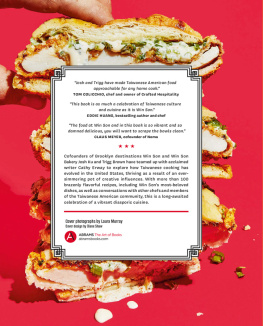

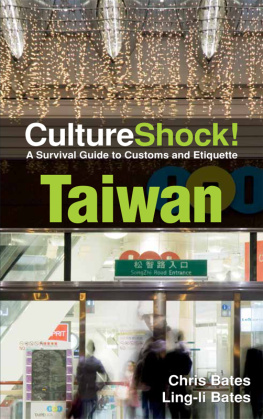
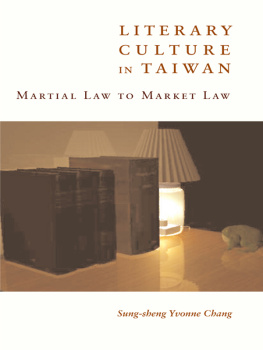
![Frankie Gaw - First Generation : Recipes from My Taiwanese-American Home [A Cookbook]](/uploads/posts/book/409729/thumbs/frankie-gaw-first-generation-recipes-from-my.jpg)
